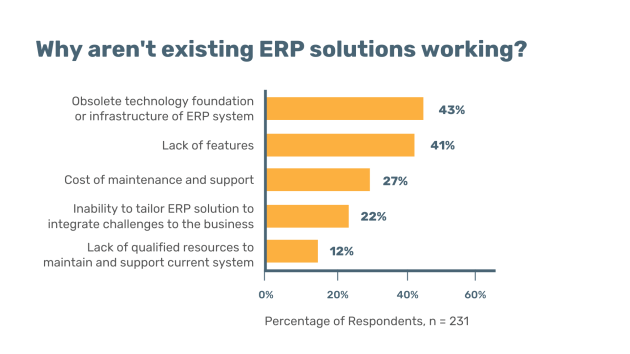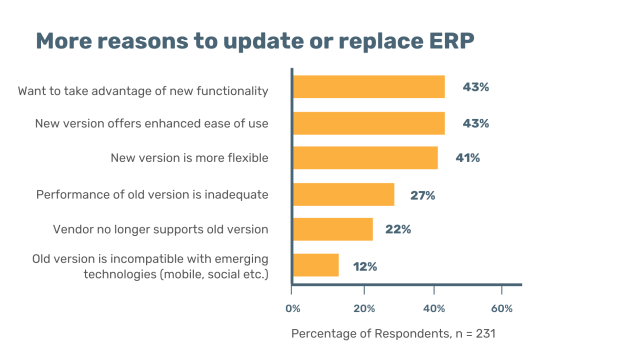Overcoming legacy enterprise systems with modern, best-of-breed technology
Article by CitySoft | Free Solution Design & E-book HERE | 1300 762 762 | sales@citysoft.net.au
To get the full value of the fourth industrial revolution, food and beverage manufacturers must have an ERP system that can fully integrate the operational technology needed in order to become a data-driven enterprise.
Unfortunately, legacy ERP has a problem. According to a recent Report on ERP Systems and Enterprise Software, Panorama Consulting Solutions said that only 12 per cent of corporate executives were “very satisfied” with their current ERP solution, and that 59 per cent of global businesses were actively burdened with them.
The problem is that with the changes in technology demanded by Industry 4.0, the requirements of businesses have changed considerably. Technology is continuously evolving and moving fast, while information is needed now and on demand. Legacy ERP applications are finding it increasingly difficult to cope.


Problems with legacy ERP include:
- A lack of up-to-date information. Legacy ERP systems may not have the reporting capabilities and the up-to-date, real time access to information required by food and beverage manufacturers.
- A lack of flexibility. Often legacy ERP systems don’t have the flexibility and ability to make industry specific changes. This can cause problems with day-to-day operations, but may also affect long-term business planning.
- Complexity. Legacy ERP systems have a reputation for being unwieldy and complicated to use. If the ERP system is particularly unfriendly to use, employees won’t use it, particularly if it means more work than avoiding it altogether.
- The cost of maintenance. Legacy ERP systems have a reputation for being particularly costly to keep running day-to-day, particularly if they have undergone customisation to meet certain business needs.
- Strain on IT resources. Legacy ERP systems may have been programmed in languages that aren’t regularly in use anymore, and it may be difficult to find the right people with the right skills to keep the technology.
CitySoft Consulting Group has been assisting clients in the successful selection and implementation of finance, distribution and manufacturing ERP for Australian businesses for more than 10 years.
“We’ve seen so many businesses bypassed in the digital revolution, especially in the COVID era, because it was perceived as ‘too difficult’ to embrace a change mandate that brutally assessed and replaced non performing, unintegrated redundant business process methodologies” said Anthony Russo, principal consultant at CitySoft.
“By the time these businesses realised customers were demanding engagement models such as eCommerce and integrated supply chain as a frictionless experience, they were confronted with the task of change to rectify declining sales and market presence. This made the decision process more difficult. Unfortunately, they often surrendered to competitors as a distressed seller or exited their sector completely without capital appreciation for their endeavour”.
The right advice at the right time counts. CitySoft tailored solutions can replace legacy ERP systems for food and beverage businesses looking to make important business decisions quickly, streamline compliance, eliminate inefficiencies, and increase productivity. Two current, high demand solutions currently being delivered include:
Meet regulations with traceability and compliance tools
Sage X3 has strong traceability tools, allowing the better handling of recalls, expiration management, sustainability, allergen-free production, labelling, and other major trending concerns. The solution will help you meet evolving requirements, without increasing overhead.
Forecast supply and demand
Many food and beverage businesses struggle to anticipate demand, leading to wasted stock or lost sales from understocking. With powerful business intelligence tools, CitySoft Business Cloud Enterprise Management can quickly draw on historic data to produce accurate forecasts—saving your business money.
Food and beverage businesses leaving behind legacy ERP applications will be looking for a business management solution that has a strong foundation and history with food manufacturing and processing, supporting these unique requirements with minimal customisation. CitySoft Business Cloud Enterprise Management provides an innovative core of crucial business intelligence and management functions for the food and beverage industry, supporting greater transparency and food safety.
To receive a FREE solution design consultation and download a FREE E-BOOK fill in the form HERE.
You can also speak to a solution architect today on 1300 762 762 or contact us at sales@citysoft.net.au
For more information, visit CitySoft at:






